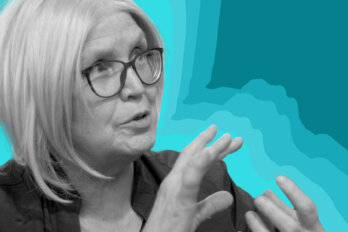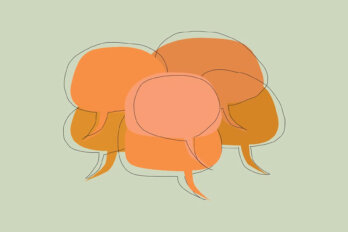
POLITICS / NOVEMBER 2024
It’s Hard to Tell What Poilievre Makes of the World
Besides being anti China, the Conservatives have been largely silent on their foreign policy
BY JONATHAN MANTHORPE
ILLUSTRATION BY JAMIE BENNETT
Published 7:44, SEP. 18, 2024
The Conservative Party manifesto, published in September 2023, describes a broad approach to world affairs in its two pages and nine clauses on foreign policy. It is only on promised actions against Beijing that it offers an itemized agenda. It is a short and sharp to-do list. The Conservatives say they will end military co-operation with Beijing, stop Chinese participation in sensitive Canadian research facilities, ban companies linked to the Chinese Communist Party from owning Canadian companies or buying sensitive technology, and campaign for China to be removed from the World Trade Organization until it reforms its economy.
The Conservative Party’s visceral distaste for the CCP regime in Beijing is logical. There was an intense chill in bilateral relations under the first government of the reformed Conservative Party led by Stephen Harper after it raised questions about China’s human rights record in Xinjiang and Tibet in particular. Along with this inherited ideological mistrust of Beijing, Pierre Poilievre and his party have the immediate grievance that the CCP has tried to interfere in the Canadian election process with the aim of defeating Conservative candidates or influencing which candidates get selected by the parties’ constituency associations.
The brief references to the Conservatives’ foreign policy in the manifesto loom large because their vision of “Canada in the world” is otherwise hard to find in the party’s public discourse. This has caused some head scratching and a frenetic hunt for clues among foreign diplomats in Ottawa—and speculation among Canadian commentators that perhaps Poilievre is so parochial a politician that he thinks little about the world beyond this country’s borders.
More broadly, the manifesto and statements by Tory MPs envisage introducing a tight framework for foreign aid, both in deciding which countries get it and how it is managed. Poilievre said early this year he would cut “wasteful foreign aid” and end funding to “dictators, terrorists and multinational bureaucracies.” The aim was to free up money to raise the proportion of gross domestic product spent on Canada’s armed forces, from 1.37 percent now to at least 2 percent—the level all members of the North Atlantic Treaty Organization are meant to spend. For many years, Canada has been near the bottom of the list of contributors among the thirty-two NATO members and has come under repeated criticism from fellow members for freeloading. Poilievre, however, subsequently backtracked. “I make promises that I can keep, and right now we are, our country is, broke after nine years of Trudeau,” he said at a press conference when asked about meeting the NATO target.
Much of the management of foreign affairs by governments tends to be geared toward how to respond to nasty surprises. In the world today, there is enough known nastiness in Eastern Europe, the Middle East, and Asia to keep a Poilievre government busy even before the added surprises that are inevitably in store.
In the Middle East, the Conservative Party has been a staunch supporter of Israel for a long time. Poilievre wants to strengthen that commitment. The party manifesto advocates the contentious act of moving the Canadian embassy from Tel Aviv to Jerusalem, which the Israeli government claims as its capital despite the city’s division with Palestinians. In March, the entire Conservative caucus in Parliament voted against a non-binding New Democratic Party motion to formally recognize the state of Palestine. A few days later, Poilievre told an audience at a synagogue in Montreal that he regards the Jewish people as the only true indigenous people of the land occupied by Israel.
The Conservative leader also intends to try to mend relations with the government of Narendra Modi in New Delhi and strengthen trade and diplomatic ties with India. There is one big fence to mend before this can be achieved, though, as ties between the two countries went into deep freeze after Justin Trudeau accused the Indian government of involvement in the killing of Sikh leader Hardeep Singh Nijjar in Surrey, BC, last year. Speaking to a media outlet last October, Poilievre said, “It’s fine to have our disagreements and hold each other accountable, but we have to have a professional relationship, and that is what I will restore when I’m prime minister of this country.”
Coming to Eastern Europe, the Russian invasion of Ukraine and the continuing war are of the most pressing concern for Canada. Russian leader Vladimir Putin has indicated that his aim is to restore the Russian empire. As several of the countries gathered up by the Soviet Union after World War II, and which were liberated when it collapsed in 1991, are now members of NATO, Putin’s agenda presents an immediate risk to Canada. If NATO gets directly involved in a war with Russia, so will Canada under the alliance’s all-for-one-and-one-for-all commitment.
Yet, as a campaigning opposition leader, Poilievre appeared to see the issue through the prism of domestic politics. When Russia renewed its invasion of Ukraine in February 2022 after its 2014 seizure of Crimea and some eastern Ukrainian provinces, Poilievre backed accepting Ukrainian refugees and giving the Kyiv government all material support possible. There are about 1.3 million Canadians of Ukrainian heritage, comprising about 3 percent of the population. Early this year, however, Poilievre was less firm in his backing; polls showed that of the people who thought Canada was offering “too much support” to Ukraine, close to half were Conservative Party voters.
Thus, all indications are that Poilievre’s initial impulse in government would be to shape his foreign policy around the demands of his domestic audiences. But like many government leaders before him, he will find that events exert their own tyranny and demand a broader, national response.




